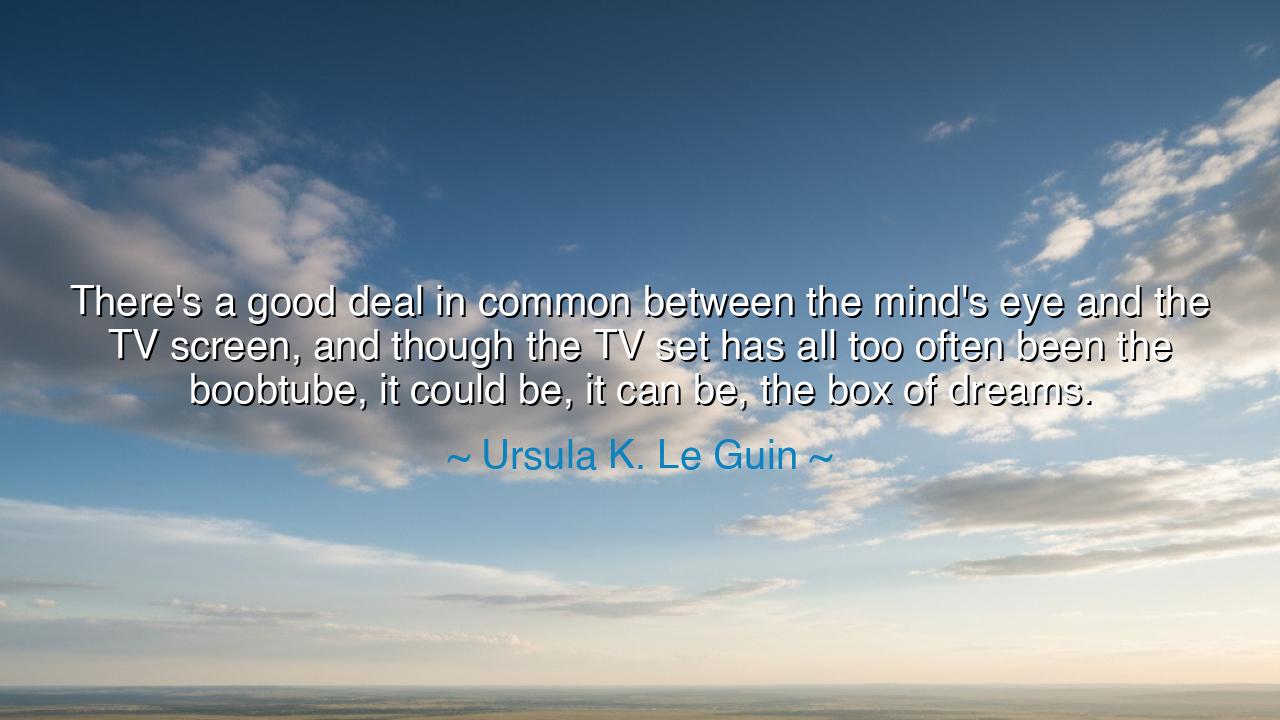
There's a good deal in common between the mind's eye and the TV
There's a good deal in common between the mind's eye and the TV screen, and though the TV set has all too often been the boobtube, it could be, it can be, the box of dreams.






When Ursula K. Le Guin wrote, “There’s a good deal in common between the mind’s eye and the TV screen, and though the TV set has all too often been the boobtube, it could be, it can be, the box of dreams,” she spoke as both a storyteller and a seer — one who understood the power of imagination in the modern age. Her words are not simply about technology, but about perception, creation, and the eternal struggle between banality and wonder. In the ancient world, the poet’s voice and the philosopher’s mind were the conduits through which vision entered the hearts of humankind. In Le Guin’s time, the television had become that new oracle — yet one often misused, its light wasted on noise rather than revelation. And so she called upon her readers, not merely to watch, but to dream.
Le Guin saw the mind’s eye — that inner power of imagination — as humanity’s oldest tool for meaning. Long before machines transmitted images, the storyteller painted visions in the air. The bards and shamans of old could conjure worlds with only their words, awakening in the hearts of their listeners vast landscapes of fear, beauty, and hope. The TV screen, in its essence, is an externalized version of this ancient mirror — a canvas for the collective imagination. Yet, as Le Guin warns, it had become too often a “boobtube,” a dull mirror of distraction, numbing rather than nourishing. What could have been an altar of dreams had, for many, become a shrine to emptiness.
In her lifetime, Le Guin witnessed both the rise of mass media and the loss of deep storytelling. Her own art — the novel, the myth, the fable — required active imagination, the participation of the reader’s mind’s eye. But the television, when misused, replaced creation with consumption. People ceased to dream for themselves; they let others dream for them. Le Guin’s lament was not an attack on technology, but a plea for its redemption — for artists and viewers alike to reclaim the TV screen as a box of dreams, a place where truth, myth, and vision could once again meet.
Consider the example of Jim Henson, creator of The Muppets and Fraggle Rock. He too saw television as a realm for imagination, not manipulation. In a time when screens were often filled with violence and vanity, Henson created worlds of joy, wisdom, and moral wonder. His shows did not dull the mind — they awakened it. They taught children compassion, courage, and curiosity. Henson’s work embodies Le Guin’s ideal: the transformation of the boobtube into the box of dreams, a screen not of sedation, but of inspiration.
Le Guin’s insight also echoes an older truth: that the tools of humankind are neither good nor evil in themselves — it is the intention that gives them power. Fire can warm or burn, the sword can defend or destroy, and the television can either enslave or enlighten. In this, Le Guin’s teaching becomes universal. She speaks not only to creators of media, but to all who wield the gifts of mind and imagination. The mind’s eye, if left idle, can be corrupted by trivial visions; but when guided by purpose and reverence, it becomes the architect of culture and the shaper of destiny.
And so, her words are a challenge to every generation that gazes into glowing screens. What do you choose to see? What do you allow to fill your inner vision? Do you let the box of dreams lull you into sleep, or do you awaken through it to new worlds of empathy and understanding? The question is not what the screen shows, but what your mind’s eye perceives. The images of the world are tools for the soul; use them wisely, and they can build kingdoms of imagination. Use them foolishly, and they become chains.
Therefore, take this as both warning and invitation. Do not despise the age of images — rather, redeem it. Fill the screens of your life — whether they be televisions, phones, or the visions of your own heart — with beauty, truth, and meaning. Watch not merely for pleasure, but for awakening. Seek creators who dream deeply, and be one yourself. For as Le Guin teaches, the mind’s eye and the TV screen are mirrors of the same power: the human capacity to imagine worlds into being. If you treat them with reverence, the light that shines from the screen will not blind you — it will guide you, like the fire of Prometheus, toward the divine realm of dreams made real.






AAdministratorAdministrator
Welcome, honored guests. Please leave a comment, we will respond soon